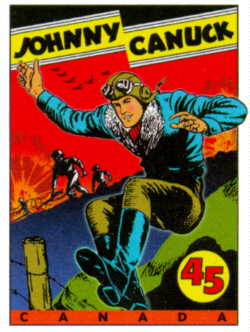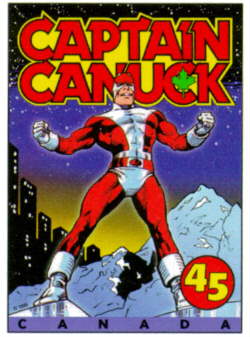If You Call Me "Canuck," Should I Be Offended, or Should I Put On Some Tights
Back on February 21, Rochester's Democrat and Chronicle published this letter to the editor by Gary Webb of Victor:
That said, it did make me wonder where canuck came from, and why Vancouver would use it as its hockey team's nickname.
According to the Vancouver Canucks website, the team is named after a character with origins in 19th-century political cartoons:

There are theories that canuck originated as a nickname for aboriginal peoples on the West Coast--the Chinook or the South Sea Islanders that worked in the French fur trade--but it looks as if it gained currency as that more generic term. Gary Wyshynski also reminds us that Johnny Canuck was a comic-book hero that fought Hitler in the 1940s:

My own non-hockey canuck memories are of this Trudeau-era do-gooder:
A fine moment in Rochester Americans hockey history took place in the ’70s, when ownership ties were severed with the Vancouver Canucks. As a native Canadian, I am greatly offended by the use of the term “Canuck.” Forget about the Washington Redskins (Feb. 17 editorial, “Retire offensive sports mascots”); after all these years, why hasn’t Vancouver been required to change its extremely disrespectful, dehumanizing name?If I didn't know better, I'd say someone on the editorial staff really doesn't like Gary Webb. The hyperbolic tone and false equivalence (there's no way canuck is as offensive as redskins), the revisionist historical nugget (did the Americans really break it off with its NHL parent in a fit of righteous indignation?), the vague self-identification as a "native Canadian" (born there or First Nations?), the accusatory rhetorical question at the end: this is just an entertainingly embarrassing letter.
That said, it did make me wonder where canuck came from, and why Vancouver would use it as its hockey team's nickname.
According to the Vancouver Canucks website, the team is named after a character with origins in 19th-century political cartoons:
Johnny Canuck was created as a lumberjack national personification of Canada. he first appeared in early political cartoons where he was portrayed as a younger cousin of the United States' Uncle Sam and Britain's John Bull. Depicted as a wholesome, if simple-minded, fellow in the garb of a habitant, farmer, logger, rancher or soldier, he often resisted the bullying of John Bull or Uncle Sam.Roberto Luongo decorarted his goalie mask with a stylized version of that original Johnny Canuck for the 2011-12 season:

There are theories that canuck originated as a nickname for aboriginal peoples on the West Coast--the Chinook or the South Sea Islanders that worked in the French fur trade--but it looks as if it gained currency as that more generic term. Gary Wyshynski also reminds us that Johnny Canuck was a comic-book hero that fought Hitler in the 1940s:

My own non-hockey canuck memories are of this Trudeau-era do-gooder:
